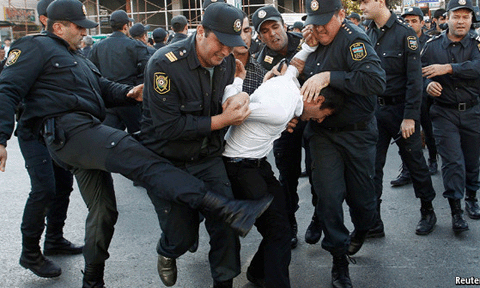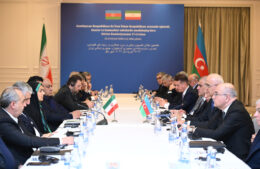Azerbaijan and the Council of Europe – Do as we say, not as we do
- (0)
Azerbaijan and the Council of Europe – Do as we say, not as we do –
The Economist
Few people worry about which country chairs the committee of ministers of the Council of Europe (CoE), a body of 47 European countries, committed to upholding human rights, democracy and the rule of law. But with Azerbaijan taking the helm on May 14th, perhaps more should. After all, few European governments have done more to undermine those standards than the regime in Baku.
This is not the first time a repressive government has held the role. Russia’s dismal human rights record did not prevent it from chairing the CoE in 2006, under the slogan “Towards a united Europe without dividing lines”.
Flush with oil and gas revenues, Azerbaijan’s living standards have risen considerably in the last decade. GDP per capita has increased almost sevenfold since 2004, according to the World Bank, and Baku’s glitzy skyline is a world away from the drab, post-Soviet city of the early 1990s. But material progress has come at a cost: rigged elections and suppression of internal dissent mean that Azerbaijan’s democracy is little more than a sham.
Europe and the United States, reliant on Azerbaijan’s energy supplies, have largely looked the other way and Baku’s “caviar diplomacy” has won it friends in western circles, not least in the CoE. Since Ilham Aliev, the country’s president, is famously sensitive to criticism from abroad, western officials have learnt to pull their punches, despite occasional noises to the contrary.
That is worrying on its own terms: after all, what is the point of a club if members can flout its rules with impunity? Far from tempering its behaviour, Baku has actually stepped up its suppression of internal dissent in recent weeks. Dozens of youth activists have been imprisoned since January, supposedly for illegal arms possession and plotting mass disorder. Last month eight of them went on a two-week hunger strike and the authorities also detained two prominent human rights defenders on bogus espionage charges.
Recent events in Ukraine highlight the importance of the CoE’s founding principles. As Carl Bildt, the Swedish foreign minister, noted in his recent statement at the CoE: “When Russia occupied and annexed Crimea, it violated…one of the very basic principles of the security and stability of our continent.” But in practice, fear of overdependence on Russian oil and gas has increased Azerbaijan’s value as an alternative energy conduit to Europe. Baku’s free pass on human rights issues is likely to continue.
Azerbaijan’s relationship with Russia is far from trouble-free. With Armenian troops controlling Nagorno-Karabakh and surrounding areas in Azerbaijan, the implication of Russia’s actions – that borders can be easily redrawn – is deeply threatening to Baku. Yet wary of offending its powerful northern neighbour, Mr Aliev’s regime has avoided any Russia-bashing over the last few months.
Instead, the government says it will use its chairmanship to focus on human-rights education and corruption, among other things. Azerbaijan’s imprisoned hunger strikers highlight the irony of this first goal. And despite its claims of recent success in fighting graft, Azerbaijan (alongside Russia) remains the most corrupt country in the CoE, according to Transparency International, a watchdog. That is no coincidence. As Azerbaijanis know all too well, corruption and political repression go hand in hand.



















